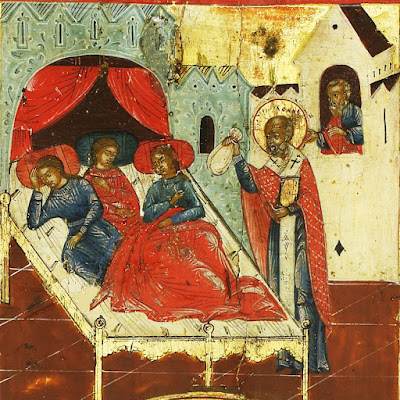Dear Parish Faithful,
"I behold a strange and most glorious Mystery!"
(Canon of the Nativity of Christ, Ode Nine)
Even though at this moment I am not sure what we will be able to "salvage" of our Nativity liturgical services due to the impending snowstorm and frigid temperatures, I would still like to make a few comments about "The Orthodox Christmas." It is simply ... "different" than what is encountered - or so I am led to believe - in other non-Orthodox churches. That difference, in turn, can evoke a wide spectrum of responses: refreshing, intriguing, odd or disappointing. Over the years, I have heard all of these responses from folks who celebrated their first Christmas in the Orthodox Church. Hence, my brief comments offered here.
One major difference is that there is no special Christmas Eve service in the Orthodox Church: no processions or unique candlelight vigils accompanied by traditional Christmas carols (many of which are both beautiful and theologically sound - "Hail the incarnate Diety" from "Hark the Herald Angels Sing"). In the Church, the traditional cycle of liturgical services remain in their basic structures - Vespers, Compline, Matins and the Liturgy - and into that structure is inserted all of the rich hymnography and scriptural readings that are appointed for the Nativity. The services are imbued with a real festal expression, but again, the basic structures remain. Older Orthodox cultures all have a "folk" element, for lack of a better term, and there you will find a different set of carols and traditions; but these are enjoyed outside of the Church's liturgical cycle of services.
In the parish this year, we have been serving the Prefestal Nativity Vespers, the Royal Hours (now cancelled due to the weather) and Matins and Liturgy. And even Matins is tentative at the moment. Therefore, I would highly recommend that you click on the link provided here, and scroll down to December 24, and read the texts for the various Nativity services that are provided. You will encounter the endlessly rich hymnography praising Christ - the "incarnate Diety" - together with the Theotokos and Ever-Virgin Mary, Joseph the Betrothed, the shepherds and wise men, etc.
So, it may prove refreshing, intriguing, odd or disappointing depending upon one's perspective as a first-time or new participant in the "Orthodox Christmas." Best to be prepared I would think. The approach is different, but it would be hard to walk away unaware of the "strange and most glorious Mystery" of the Incarnation of the Word of God.
Hoping we can gather for worship as a parish community and family!
In Christ,
Fr. Steven













